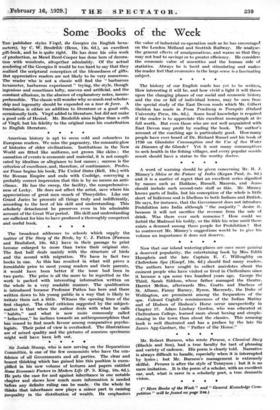American history is apt to seem cold and colourless to
European readers. We miss the pageantry, the romantic glow of histories of older civilizations; Institutions in the New World are fitted like uniforms, not grown like skins ; the causation of events is economic and material, it is not compli- cated by idealism or allegiance to lost causes ; success is the criterion of excellence, and, therefore, of continuance. Profes. sor Pease begins his book, The United States (Bell, 16s.) with the Roman Empire and ends with Coolidge, conveying a probably correct impression that this is by no means an anti- climax. He has the sweep, the facility, the comprehensive- ness of Lecky. He does not affect the artist, save where his appreciations of great men smack of Thucydides. Like our Grand Juries he presenti all things truly and indifferently; according to the best of his skill and understanding. This scholarly detachment he preserves even in his admirable account of the Great War period. Hii skill and understanding are sufficient for him to have produced a thoroughly competent and useful book.
▪ * *










































 Previous page
Previous page